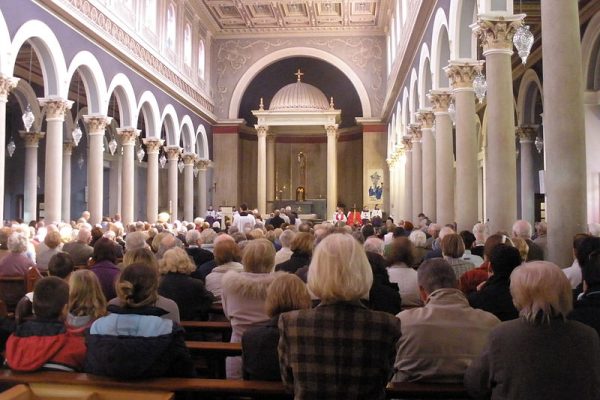Home>Theology and Spirituality>What Is A Communion Service


Theology and Spirituality
What Is A Communion Service
Published: February 19, 2024
Ericka Andersen, an editor at Christian.net, expertly merges digital strategy with content creation, focusing on faith and societal issues. Her communication skills enhance the platform's engaging narratives, fostering meaningful dialogue on belief's impact on society.
Learn about the significance and practices of a communion service in theology and spirituality. Explore the traditions and rituals involved in this sacred ceremony.
(Many of the links in this article redirect to a specific reviewed product. Your purchase of these products through affiliate links helps to generate commission for Christian.net, at no extra cost. Learn more)
Table of Contents
Introduction
The communion service, also known as the Lord's Supper or the Eucharist, holds a central place in the Christian faith. It is a sacred ritual that symbolizes the profound spiritual connection between believers and their Lord. This timeless tradition has been celebrated for centuries, serving as a poignant reminder of the sacrificial love and redemptive grace of Jesus Christ.
The communion service is a deeply meaningful and symbolic practice that transcends denominational boundaries, uniting Christians in a shared expression of faith and reverence. Whether celebrated in a grand cathedral, a humble chapel, or a home fellowship, the communion service serves as a poignant reminder of the foundational principles of Christianity.
At its core, the communion service is a sacred act of remembrance, commemorating the Last Supper, a pivotal event in the life of Jesus Christ. It is a time for believers to reflect on the selfless sacrifice of Christ, who offered His body and blood for the salvation of humanity. This act of remembrance fosters a profound sense of gratitude and humility, as Christians contemplate the immense love and compassion demonstrated through Christ's ultimate sacrifice.
The communion service also serves as a unifying force within the Christian community, fostering a sense of fellowship and spiritual communion among believers. It transcends cultural and linguistic barriers, bringing together individuals from diverse backgrounds under the common banner of faith and devotion. Through the shared experience of partaking in the communion elements, believers reaffirm their spiritual kinship and commitment to the teachings of Christ.
As we delve into the significance, history, and practices associated with the communion service, it becomes evident that this sacred ritual occupies a hallowed place in the hearts of believers worldwide. Its enduring relevance and profound symbolism continue to inspire and uplift countless individuals, serving as a timeless testament to the enduring power of faith and the transformative message of redemption.
What is a Communion Service?
A communion service, also referred to as the Lord's Supper or the Eucharist, is a sacred ritual practiced in various Christian denominations. It holds deep spiritual significance as it commemorates the Last Supper, a pivotal event in the life of Jesus Christ. During this intimate gathering with his disciples, Jesus shared bread and wine, symbolizing his body and blood, and instructed his followers to partake in remembrance of him.
At its essence, the communion service serves as a profound act of remembrance and spiritual communion. It symbolizes the sacrificial love and redemptive grace of Jesus Christ, inviting believers to reflect on the profound significance of his ultimate sacrifice. Through the partaking of the communion elements, believers express their gratitude for Christ's selfless devotion and reaffirm their commitment to his teachings.
The communion service also serves as a unifying force within the Christian community, fostering a sense of fellowship and spiritual communion among believers. It transcends cultural and linguistic barriers, bringing together individuals from diverse backgrounds under the common banner of faith and devotion. Through the shared experience of partaking in the communion elements, believers reaffirm their spiritual kinship and commitment to the teachings of Christ.
The act of communion is deeply symbolic, representing the spiritual nourishment and sustenance that believers receive through their relationship with Christ. It serves as a poignant reminder of the enduring presence of Christ in the lives of believers and the transformative power of his redemptive love.
In essence, the communion service is a sacred and deeply meaningful practice that embodies the core principles of Christian faith. It serves as a tangible expression of devotion, unity, and remembrance, inviting believers to partake in a timeless tradition that transcends denominational boundaries and cultural differences. Through the communion service, believers are invited to experience a profound sense of spiritual connection and renewal, drawing closer to the heart of their faith and the enduring message of Christ's love and sacrifice.
The History of Communion
The history of communion can be traced back to the Last Supper, a momentous event in the life of Jesus Christ. It was during this intimate gathering with his disciples that Jesus instituted the practice of communion, imbuing it with profound spiritual significance. As depicted in the Gospels of Matthew, Mark, and Luke, Jesus shared bread and wine with his disciples, symbolizing his body and blood, and instructed them to partake in remembrance of him.
The roots of communion can be found in the rich tapestry of Jewish tradition, specifically the Passover meal. Jesus, a devout Jew, imbued the elements of bread and wine with new meaning, transforming them into symbols of his impending sacrifice and the establishment of a new covenant between God and humanity. This transformative act laid the foundation for the communion service, infusing it with deep theological and spiritual significance.
Following the crucifixion and resurrection of Jesus, the early Christian community embraced the practice of communion, viewing it as a sacred and solemn remembrance of Christ's sacrificial love. The apostle Paul, in his first letter to the Corinthians, provided further insight into the significance of communion, emphasizing its role in fostering spiritual unity and remembrance within the Christian community.
Over the centuries, the practice of communion evolved within various Christian traditions, each imbuing it with unique theological interpretations and liturgical expressions. The early church fathers, such as Ignatius of Antioch and Justin Martyr, offered profound insights into the spiritual and communal dimensions of the communion service, shaping its theological underpinnings and liturgical practices.
The Protestant Reformation brought about further developments in the understanding and celebration of communion. Reformers such as Martin Luther, John Calvin, and Ulrich Zwingli articulated diverse perspectives on the nature of Christ's presence in the communion elements, leading to theological debates and doctrinal distinctions that continue to influence Christian worship practices today.
Throughout history, the communion service has endured as a timeless and revered tradition, transcending cultural and denominational boundaries. Its rich historical legacy and enduring spiritual significance continue to inspire and unite believers worldwide, serving as a poignant reminder of the redemptive love and sacrificial grace of Jesus Christ.
The Importance of Communion
The communion service holds profound significance within the Christian faith, serving as a poignant reminder of the sacrificial love and redemptive grace of Jesus Christ. Its importance is multifaceted, encompassing spiritual, communal, and theological dimensions that resonate deeply with believers across denominational lines.
At its core, the communion service is a sacred act of remembrance, inviting believers to reflect on the selfless sacrifice of Christ. It serves as a tangible expression of gratitude and humility, prompting individuals to contemplate the immense love and compassion demonstrated through Christ's ultimate sacrifice on the cross. Through the partaking of the communion elements, believers reaffirm their faith in the redemptive power of Christ's sacrifice, finding solace and strength in the enduring message of hope and reconciliation.
Furthermore, the communion service fosters a profound sense of spiritual communion and unity within the Christian community. As believers gather to partake in the communion elements, they are reminded of their shared identity as members of the body of Christ. This shared experience transcends cultural and linguistic barriers, uniting individuals from diverse backgrounds in a common expression of faith and devotion. The communion service thus serves as a unifying force, strengthening the bonds of fellowship and mutual support among believers.
From a theological perspective, the communion service embodies the core tenets of Christian doctrine, encapsulating the themes of redemption, atonement, and spiritual nourishment. It symbolizes the spiritual sustenance that believers receive through their relationship with Christ, underscoring the transformative power of his redemptive love. The act of partaking in the communion elements signifies a deepening of one's spiritual connection with Christ, reaffirming the believer's participation in the new covenant established through Christ's sacrifice.
In essence, the importance of the communion service lies in its ability to encapsulate the foundational principles of the Christian faith in a tangible and transformative manner. It serves as a timeless testament to the enduring power of faith and the transformative message of redemption, inviting believers to partake in a sacred tradition that transcends denominational boundaries and cultural differences. Through the communion service, believers are invited to experience a profound sense of spiritual connection and renewal, drawing closer to the heart of their faith and the enduring message of Christ's love and sacrifice.
The Elements of Communion
The elements of communion, namely bread and wine (or grape juice in some traditions), hold profound symbolic significance within the Christian faith. These elements, when consecrated and partaken during the communion service, serve as tangible representations of Christ's body and blood, as well as the enduring covenant between God and humanity.
The bread, often unleavened, symbolizes the body of Christ, broken for the redemption of humanity. Its significance can be traced back to the Last Supper, where Jesus took bread, blessed it, and gave it to his disciples, instructing them to partake of it as a remembrance of him. This act of sharing the bread underscored the sacrificial nature of Christ's impending crucifixion, emphasizing the profound love and selflessness embodied in his redemptive mission.
Similarly, the wine (or grape juice) symbolizes the blood of Christ, shed for the forgiveness of sins. Just as Jesus shared the cup of wine with his disciples, imparting new meaning to this familiar element, the act of partaking in the consecrated wine during the communion service signifies a deep spiritual communion with Christ and a reaffirmation of the new covenant established through his sacrifice.
The act of consecrating the bread and wine during the communion service is imbued with profound theological and spiritual significance. Through prayer and invocation, these elements are set apart for sacred use, symbolizing the sanctification of Christ's body and blood and the spiritual nourishment received through communion. This act of consecration underscores the sacred nature of the communion elements and their role in fostering spiritual renewal and communion among believers.
The elements of communion serve as powerful symbols of Christ's sacrificial love and the redemptive grace extended to humanity. They invite believers to partake in a tangible expression of their faith, commemorating the enduring significance of Christ's sacrifice and the establishment of a new covenant based on love, forgiveness, and reconciliation. Through the partaking of these elements, believers are invited to experience a profound sense of spiritual nourishment and renewal, drawing closer to the heart of their faith and the transformative message of Christ's love and sacrifice.
How Communion is Celebrated
The celebration of communion varies across different Christian traditions and denominations, yet it universally embodies the solemn remembrance of Christ's sacrifice and the spiritual communion of believers. The manner in which communion is celebrated reflects the rich diversity of worship practices and theological interpretations within the Christian faith.
In many Christian churches, the communion service, also known as the Eucharist, is typically integrated into the broader context of a worship service. The sequence of the communion service often follows a prescribed liturgical order, encompassing prayers, readings from scripture, hymns, and a homily that expounds on the significance of communion. This structured approach serves to contextualize the act of communion within the overarching narrative of Christian worship, emphasizing its integral role in the spiritual life of believers.
Central to the celebration of communion is the consecration of the bread and wine, a sacred act performed by ordained clergy or designated ministers. Through prayer and invocation, the elements are set apart for sacred use, symbolizing the sanctification of Christ's body and blood. This act of consecration underscores the sacred nature of the communion elements and their role in fostering spiritual renewal and communion among believers.
The distribution of the communion elements varies across traditions, with some churches employing a common cup for the sharing of wine and others utilizing individual cups. The manner of receiving the elements also differs, ranging from the practice of intinction, where the consecrated bread is dipped in the wine, to the distribution of pre-cut portions of bread and individual servings of wine or grape juice.
The act of partaking in the communion elements is characterized by reverence and introspection, as believers approach the communion table to receive the bread and wine. This solemn moment of communion invites individuals to reflect on the sacrificial love of Christ and to reaffirm their faith in the redemptive power of his sacrifice. It serves as a tangible expression of gratitude and humility, prompting believers to contemplate the immense love and compassion demonstrated through Christ's ultimate sacrifice on the cross.
Ultimately, the celebration of communion serves as a poignant reminder of the enduring significance of Christ's sacrifice and the establishment of a new covenant based on love, forgiveness, and reconciliation. It invites believers to experience a profound sense of spiritual nourishment and renewal, drawing closer to the heart of their faith and the transformative message of Christ's love and sacrifice.
Different Traditions and Practices
The celebration of communion encompasses a diverse array of traditions and practices across various Christian denominations, reflecting the rich tapestry of worship customs and theological interpretations within the global Christian community. These distinct traditions and practices offer unique insights into the multifaceted nature of communion, underscoring its enduring significance and spiritual resonance.
In the Roman Catholic tradition, the celebration of communion, known as the Eucharist, holds a central place in the liturgical life of the Church. The Eucharistic celebration is characterized by its solemnity and reverence, with the belief in transubstantiation, wherein the bread and wine are believed to undergo a profound spiritual transformation, becoming the actual body and blood of Christ. This theological understanding shapes the manner in which communion is approached and revered within the Catholic tradition, emphasizing the real presence of Christ in the consecrated elements.
Within the Eastern Orthodox tradition, the celebration of communion, referred to as the Divine Liturgy, is marked by its rich symbolism and intricate liturgical rites. The Orthodox Church places a strong emphasis on the mystical and sacramental nature of communion, viewing it as a profound encounter with the divine. The use of elaborate liturgical vestments, incense, and sacred music enhances the sensory experience of communion, underscoring its transcendent and transformative nature.
In Protestant traditions, communion practices vary widely, reflecting diverse theological perspectives and worship styles. In Anglican and Episcopal churches, the celebration of communion, often referred to as the Holy Eucharist, combines elements of liturgical formality with congregational participation. The use of prescribed prayers and liturgical texts, coupled with congregational hymnody and responsive readings, creates a sense of communal engagement and reverence during the communion service.
In Reformed traditions, such as Presbyterian and Reformed churches, communion is often celebrated with a focus on the symbolic nature of the elements, emphasizing the spiritual significance of Christ's presence in the act of remembrance. The communion service is typically integrated into the broader context of worship, with an emphasis on the proclamation of the Word and the communal sharing of the elements.
In contemporary evangelical and charismatic traditions, communion is often celebrated with a sense of spontaneity and personal reflection, emphasizing the individual's personal relationship with Christ. The communion service may be characterized by informal worship settings, contemporary music, and opportunities for personal prayer and reflection, creating a more intimate and participatory experience for believers.
The diverse traditions and practices surrounding the celebration of communion serve as a testament to the enduring significance of this sacred ritual within the Christian faith. While the specific customs and theological interpretations may vary, the underlying reverence for Christ's sacrifice and the spiritual communion of believers remain central to the diverse expressions of communion across the Christian landscape.
Conclusion
In conclusion, the communion service stands as a timeless and revered tradition within the Christian faith, embodying the core principles of remembrance, spiritual communion, and the transformative message of redemption. From its historical roots in the Last Supper to its diverse expressions across various Christian traditions, communion serves as a poignant reminder of the sacrificial love and redemptive grace of Jesus Christ.
The significance of communion extends beyond theological doctrine, encompassing the spiritual nourishment and communal unity experienced by believers. It serves as a tangible expression of gratitude and humility, prompting individuals to contemplate the immense love and compassion demonstrated through Christ's ultimate sacrifice. The act of partaking in the communion elements fosters a profound sense of spiritual communion and unity within the Christian community, transcending cultural and denominational boundaries.
The communion service, with its symbolic elements of bread and wine, encapsulates the enduring significance of Christ's sacrifice and the establishment of a new covenant based on love, forgiveness, and reconciliation. Whether celebrated with solemnity and reverence in liturgical traditions or with spontaneity and personal reflection in contemporary settings, communion remains a sacred act of remembrance and spiritual communion that unites believers in a shared expression of faith and devotion.
As believers gather to partake in the communion elements, they are invited to experience a profound sense of spiritual connection and renewal, drawing closer to the heart of their faith and the enduring message of Christ's love and sacrifice. The communion service, with its enduring relevance and profound symbolism, continues to inspire and uplift countless individuals, serving as a timeless testament to the enduring power of faith and the transformative message of redemption.
In essence, the communion service stands as a sacred and deeply meaningful practice that transcends denominational boundaries and cultural differences. It invites believers to partake in a sacred tradition that fosters spiritual renewal, unity, and a deepened connection with the redemptive love of Jesus Christ. As the communion service continues to be celebrated across the globe, its enduring significance serves as a poignant reminder of the unifying power of faith and the transformative impact of Christ's sacrificial love.














